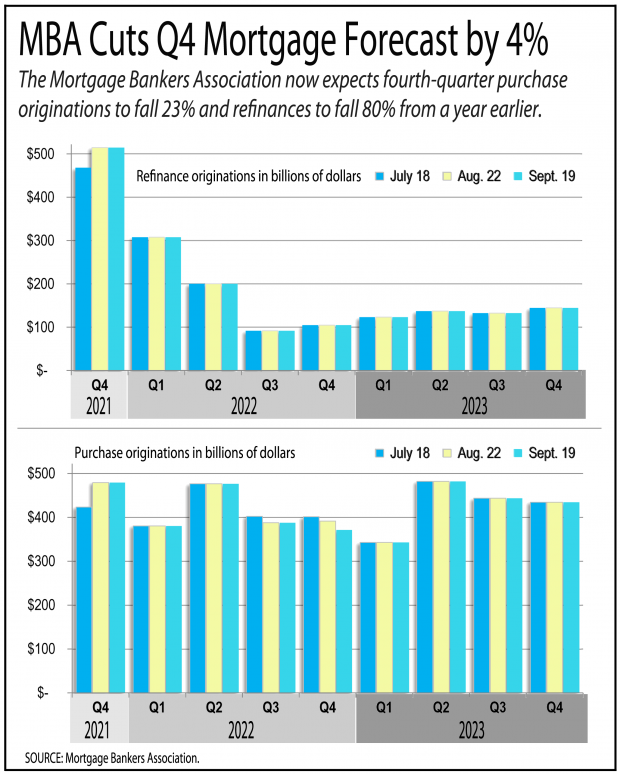
Mortgage rates started the week at their highest level in 20 years as the Mortgage Bankers Association continued to pare back expectations for mortgage originations this year.
Investopedia.com reported that the average rate for a 30-year fixed-rate purchase mortgage was 6.96% on Monday. Compared with average weekly data from Freddie Mac going back to 1971, it was the highest rate since it was 6.99% for the week ending April 12, 2002.
Recommended For You
The Mortgage Bankers Association last week lowered its forecast for fourth-quarter purchase originations for the sixth month in a row. It said it now expects homebuyers will take out $372 billion in mortgages in the fourth quarter, down 23% from a year earlier and down 4% from the $388 billion it forecast for the third quarter.
The Sept. 19 forecast left refinances untouched. They are expected to be $105 billion in the fourth quarter, down 80% from a year earlier but up 14% from the $92 billion forecast for the third quarter.
For the year, purchase originations are expected to fall 13% to $1.62 trillion, while refinances fall 73% to $706 billion. Total originations are expected to fall 48% to $2.32 trillion in 2022.
In 2023, the MBA forecast total originations will fall about 3% to $2.24 trillion as purchases rise 5% to $1.70 trillion and refinances fall 24% to $540 billion.
Rates in the 7% neighborhood might feel high for those who started buying houses in the last 10 years but they are on the low side for the past 50 years, based on Freddie Mac data published by the St. Louis Fed.
For more than half of the 2,687 weeks from April 1971 through Sept. 22, the rate was at least 7.4%. The median was 9.1% from 1971 to 1999 and 4.8% from 2000 to the present.
Rates peaked at 18.63% for the week ending Oct. 9, 1981 when the Fed under Chair Paul Volcker was battling inflation that had started during the Vietnam war. Volker's aggressive rate hikes sent the nation into a recession, but knocked back inflation.
The lowest rates from 1971 to 1999 were 6.49% for the week ending Oct. 9, 1998, when the nation was in an economic boom. The lowest over the past 51 years was 2.65% for the week ending Jan. 7, 2021 at the peak of the refinance boom that vanished as rates rose this year to tame inflation.
© 2025 ALM Global, LLC, All Rights Reserved. Request academic re-use from www.copyright.com. All other uses, submit a request to [email protected]. For more information visit Asset & Logo Licensing.






